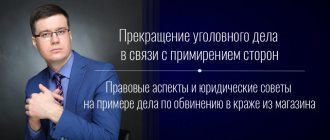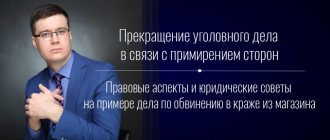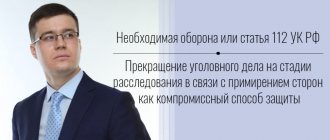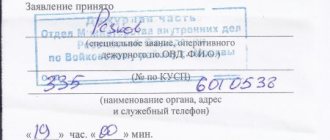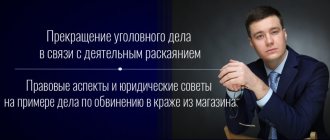As promised, the story of the suspect under Part 1 of Art. 105 of the Criminal Code of the Russian Federation!
Charge under Part 1 of Art. 105 of the Criminal Code of the Russian Federation
At 18-00, an investigator from the city of Moscow called me with a request to come to the investigative department and carry out the assigned defense of the detained suspect under Part 1 of Art. 105 of the Criminal Code of the Russian Federation.
At the same time, the investigator expressed his intention to reclassify the charged elements of the crime from Part 1 of Art. 105 of the Criminal Code of the Russian Federation on Part 2 of Art. 111 of the Criminal Code of the Russian Federation.
The investigator explained that the suspect was a young man who returned to Moscow a few days ago after completing compulsory service in the tank forces of the armed forces of the Russian Federation. Celebrating his return from the army, the suspect, while intoxicated, in the presence of witnesses, on the basis of personal hostility, inflicted numerous kicks and punches on the victim’s head. All head injuries constitute a single traumatic brain injury, which is collectively assessed as serious harm to health, all of which have a direct cause-and-effect relationship with death.
The investigator also explained the reason for his intention to assign a lawyer to the suspect. The suspect has no income, does not work, lives with his mother in a room in a communal apartment. The suspect's mother is registered at a drug treatment clinic and is a chronic alcoholic; his father is not.
Thus, the suspect does not have the funds to invite his lawyer and enter into an agreement with him to provide legal assistance in criminal proceedings. By force of law, the investigator is obliged to provide and assign a lawyer to the suspect at the expense of the state. The suspect is ready to confess and repents. Witnesses have been questioned and fully confirm the guilt of the suspect.
Several minor witnesses were questioned in the presence of legal representatives and a representative of the guardianship and trusteeship authority. The investigator additionally briefly described the circumstances of the crime committed. Allegedly, when the suspect and the witnesses were drinking alcohol near the entrance of a residential building, the victim passed by. The victim reprimanded the indicated persons for talking loudly. A quarrel arose between the victim and the suspect during which the latter struck the victim numerous blows to the head. The victim left the scene on his own and died from his injuries in his apartment.
Under such circumstances, I arrived at the premises of the investigation department. In the investigative department, alone with the suspect, I clarified the circumstances of the case. The suspect really admitted all the circumstances and repented.
However, unexpectedly for me, the suspect asked me a question: “What bus can he take to get home after the investigator has formalized everything?” I was surprised by the question and realized that the suspect did not understand what situation he was in, although there were no signs before the strange question.
In connection with the question, I explained to the suspect that he was detained on suspicion of a particularly serious crime and the court (most likely) would choose a measure of restraint for him in the form of detention. After the preliminary investigation is completed, the court will consider the criminal case and sentence the person to actual imprisonment for a long term.
Upon hearing the prospect, the suspect burst into tears and began to deny his involvement in the crime. He asked me to save him and his beloved girl, as well as his friends.
He said that he and the witnesses were detained by operational officers near the entrance of a residential building. After being taken to the police department, they (including minors) were frightened and beaten by the operational officers for a long time. The operatives promised that if he took the blame, they would all be released. The maximum sentence in court will be probation. Among those detained was the suspect's teenage girlfriend. The operatives described in detail what they would do with their friend in the pre-trial detention center and in the zone. If they do not agree, then everyone will be sent to prison, they described the horrors of correctional colonies for minors.
Then they began to beat the suspect in the presence of witnesses, thereby showing that they were next.
The suspect agreed to take the blame on the condition that they would all be released. Investigators compiled explanations from witnesses and the suspect. They demanded that I learn everything by heart. Next, the investigator arrived and interrogated witnesses who confirmed all the circumstances.
Moreover, the suspect convinced me that he had an alibi. He could not have committed the crime, since at the time of the crime he was in another place with other friends from the army.
If you believe the suspect, it became clear that the operatives decided to pin the crime on a suitable candidate living next to the victim.
Due to new circumstances, I turned to the investigator and outlined the position of the suspect.
The investigator, probably something like this only happens in movies, decided to check the testimony of minor witnesses on the spot, since the legal representatives and the representative of the guardianship and trusteeship authority had not yet left.
Witnesses and legal representatives were explained the rights, as well as the consequences of giving knowingly false testimony to the suspect and the term of imprisonment that he faces. The naive minors were shocked by the investigator’s information, as they also believed that their friend-suspect would now go home with them.
The minor witnesses renounced their earlier testimony and gave truthful testimony about their non-involvement in the crime. It turned out that 2 minor witnesses at the time of the commission of the crime were taking additional classes from private teachers, etc.
The investigator, promptly within several hours, additionally checked the suspect's alibi and the testimony of witnesses.
Operational employees began to run from office to office, anticipating the initiation of a criminal case against them for exceeding official powers.
The operatives' calculation was simple. They decided to hang the so-called “hanging”, an unsolved crime, on a young man from a dysfunctional family, and even with signs of dementia. The candidacy also attracted the operatives because he was defenseless; there was no money and no one could prevent his conviction.
The investigator rejected the operatives' offer to talk.
As a result, the investigator did not coordinate this situation with management and issued a decision to terminate the criminal prosecution of the suspect.
The suspect and his friends returned home.
The investigator explained to me that he takes full responsibility upon himself and is not going to condemn an innocent person to such a fate.
The next day, the investigator was called by his supervisor and asked the only question: “How much money did the investigator and lawyer Ivanov take to ruin such a case?”
The investigator was prepared for such a question and provided a complete certificate of the suspect’s identity. From the certificate it was possible to draw an unambiguous conclusion that the suspect could pay, but with difficulty, only for travel on public transport.
The leader also turned out to be a person incapable of doing evil and ultimately supported the investigator’s decision.
Subsequently, another investigator refused to initiate a criminal case against the operational officers.
In any case, justice prevailed. A person with high moral principles is an asset in any community. The investigator’s activities attracted the attention of management and his career was successful. Currently, the former investigator occupies one of the leading positions in the law enforcement agency.
It is always necessary to remain human in any life situations and regardless of your position in society!
sentence under Part 2 of Art. 318 of the Criminal Code of the Russian Federation
Case No. 1-29/2011
SENTENCE
In the name of the Russian Federation
March 30, 2011 Zmeinogorsk
Zmeinogorsk City Court of the Altai Territory composed of: presiding judge Masankina A.A.,
with the participation of the state prosecutor Art. Assistant of the Zmeinogorsk Interdistrict Prosecutor of the Altai Territory Kuvshinov M.M.,
victim S.
defendant Latkin N.S.,
defense lawyer of the Bar Chamber of the Altai Territory Borodulin I.V., who presented certificate No. and warrant No. dated DD.MM.YYYY,
under secretary Medvedeva I.N.,
having examined in open court the materials of the criminal case regarding:
Latkin Nikolai Sergeevich
, born DD.MM.YYYY at <address>, <data withdrawn> registered at the address: <address>, actually residing at the address: <address>, having no criminal record,
accused of committing a crime under Part 2 of Art. 318 of the Criminal Code of the Russian Federation,
u st a n o v i l:
Latkin N.S. committed violence dangerous to life and health against a government official in connection with the performance of his official duties under the following circumstances.
According to order No. dated DD.MM.YYYY S. was appointed to the position of a policeman of a separate platoon of the police patrol service of the internal affairs department at <address> from DD.MM.YYYY and thereby, being an official, constantly performs the functions of a representative of the authorities in in accordance with the Law of the Russian Federation “On the Police”. In accordance with Art. 2 of the Law of the Russian Federation “On the Police” No. 1026-1 Federal Law of April 18, 1991, the tasks of the police, among others, are to prevent and suppress crimes and administrative offenses, identify and solve crimes, protect public order and ensure public safety, provide assistance to physical and legal entities in protecting their rights and legitimate interests within the limits established by the Law of the Russian Federation “On the Police”. According to Art. 10 of the Law of the Russian Federation “On the Police”, the police, in accordance with the tasks assigned to them, are obliged to prevent and suppress crimes and administrative offenses, identify circumstances conducive to their commission and, within the limits of their rights, take measures to eliminate these circumstances; provide assistance to citizens who have suffered from crimes, administrative offenses and accidents, as well as those who are helpless or in another state dangerous to their health and life; receive and register applications, messages and other incoming information about crimes, administrative offenses and events that threaten personal or public safety, take timely measures provided for by law, identify and solve crimes. Based on the job description of a police dog handler of a separate platoon of the police patrol service of the Department of Internal Affairs at <address>, S. is obliged to prevent and suppress crimes and administrative offenses, identify circumstances conducive to their commission and, within the limits of his rights, take measures to eliminate these circumstances, provide assistance to citizens who have suffered from criminal attacks, administrative offenses and accidents, as well as those who are helpless or in another state dangerous to their health and life. According to the arrangement of the personnel of the internal affairs department at <address> according to the enhanced version of service on DD.MM.YYYY, approved by the head of the internal affairs department at <address> DD.MM.YYYY, senior police sergeant S. was in the group inspecting life support facilities. During the period of time from <data withdrawn>. DD.MM.YYYY to <data taken>. DD.MM.YYYY, the exact time has not been established by the investigation, a policeman of a separate platoon of the police patrol service of the Department of Internal Affairs at <address> senior police sergeant S., while performing his official duties, dressed in the uniform of a police officer with insignia, arrived according to N.’s message about the threat of her murder by Latkin N.S. to the house located at: <address>, where S., while performing his official duties, suggested that Latkin N.S., who was in a state of alcoholic intoxication, stop illegal actions , namely a threat to kill N.., and N. suggested writing a statement to bring N.S. Latkin to criminal responsibility. At this moment, Latkin N.S., who, seeing that S. was in the performance of his official duties and in connection with their performance, on the basis of hostile relations, had a criminal intent to use violence dangerous to life and health against a representative of the authorities in connection with the performance of his official duties. During the period of time from <data withdrawn>. DD.MM.YYYY to <data taken>. DD.MM.YYYY, the exact time has not been established by the investigation, in a house located at the address: <address>, in order to implement his intent aimed at using violence dangerous to life and health against a representative of the authorities in connection with his execution of his official duties, Latkin N.S., being intoxicated, acting deliberately, realizing that S. is a police officer, dressed in the uniform of a police officer with insignia, expressing clear disrespect for the representative of the authorities in the person of policeman S., struck 1 blow with his right hand to the area of S.’s left temple, causing physical pain, after which S. covered his face with his right hand, and Latkin N.S., continuing to implement his criminal intent, struck 1 blow to S.’s right hand, causing bodily injury in the form of a closed injury to the right hand in the form of a fracture of the fourth metacarpal bone, which caused moderate harm to health, as it resulted in long-term health problems for a period of more than 3 weeks. In striking a policeman of a separate platoon of the police patrol service at <address> S., Latkin N.S. was aware of the socially dangerous and illegal nature of his criminal actions, foresaw that his actions would cause a government official in the performance of his official duties harm will be caused that is dangerous to life and health and intended. Further, Latkin N.S.’s criminal actions against N. were stopped by a policeman from a separate platoon of the police patrol service at <address> S.
At the court hearing, the defendant Latkin N.S. fully pleaded guilty to the charges brought against him and agreed with the charges brought under Part 2 of Art. 318 of the Criminal Code of the Russian Federation and confirmed his petition for a verdict in the case without a trial, submitted voluntarily, after consultation with the defense lawyer and in his presence.
The state prosecutor and the victim did not object to the application of a special procedure for the trial, the conditions provided for in Art. 314 of the Code of Criminal Procedure of the Russian Federation were observed, therefore the criminal case was considered in a special manner.
The court comes to the conclusion that the accusation agreed with by the defendant is justified and supported by evidence collected in the criminal case.
In connection with the adoption of the Federal Law of February 7, 2011. No. 3-FZ “On Police”, Law of the Russian Federation of April 18, 1991 №
1026-I
“
On the Police
”
was declared no longer in force on March 1, 2011, that is, at the time N.S. Latkin committed the act incriminated against him, the Law “On the Police” was in force and was subject to application when bringing charges and drawing up an indictment against the defendant.
In addition, Art. Art. 2, 12 of the current Federal Law “On the Police” provide for similar tasks and areas of police activity, its responsibilities, but in a more expanded form.
The court considers N.S. Latkin’s guilt in committing the crime proven and qualifies his actions under Part 2 of Art. 318 of the Criminal Code of the Russian Federation (as amended by Federal Law No. 26-FZ of March 7, 2011) as the use of violence dangerous to life and health against a government official in connection with the performance of his official duties.
When determining the type and amount of punishment for the defendant Latkin N.S., the court, by virtue of Art. 60 of the Criminal Code of the Russian Federation takes into account the nature and degree of public danger of the crime committed, the identity of the perpetrator, mitigating circumstances, as well as the impact of the imposed punishment on the correction of the convicted person and the living conditions of his family.
By virtue of Part 2 of Art. 318 of the Criminal Code of the Russian Federation is classified as serious.
As circumstances mitigating the defendant's punishment, the court recognizes and takes into account a confession (Part 2 of Article 61 of the Criminal Code of the Russian Federation).
In accordance with Article 63 of the Criminal Code of the Russian Federation, the court did not establish circumstances aggravating the punishment of N.S. Latkin.
According to the case materials, Latkin N.S. is characterized positively and has no criminal record.
Taking into account the stated circumstances characterizing the personality of the defendant, including mitigating ones, the absence of aggravating circumstances, the court comes to the conclusion that N.S. Latkin should be sentenced to imprisonment, but using Art. 73 of the Criminal Code of the Russian Federation, since his correction and re-education, in the opinion of the court, are possible without isolation from society, and the imposition of a real punishment in the form of imprisonment will not contribute to solving the problems and achieving the goals specified in Articles 2 and 43 of the Criminal Code of the Russian Federation.
When assigning punishment, the court takes into account the requirements of Part 1 of Art. 61 of the Criminal Code of the Russian Federation, and there are no aggravating circumstances.
The mental state of N.S. Latkin does not raise any doubts in the court about his usefulness, since the defendant behaves adequately to the surrounding environment and is not registered for mental illness, which is confirmed by a certificate from a psychiatrist. Therefore, he is subject to criminal liability for the crime committed.
By virtue of Part 10 of Art. 316 of the Code of Criminal Procedure of the Russian Federation, when considering a criminal case in a special manner, procedural costs incurred in connection with the consideration of the criminal case are not subject to recovery from the defendant.
No civil claim has been filed in the case.
Based on the above, guided by Art. Art. 307-309, Art. 316 Code of Criminal Procedure of the Russian Federation, court
p r i g o v o r i l:
Recognize Nikolai Sergeevich Latkin
guilty of committing a crime under Part 2 of Art. 318 of the Criminal Code of the Russian Federation and sentence him to 3 years in prison.
By virtue of Art. 73 of the Criminal Code of the Russian Federation, the punishment imposed on N.S. Latkin is considered suspended with a probationary period of 3 years.
Oblige N.S. Latkin not to change his permanent place of residence without notifying the specialized body that carries out the correction of the convicted person, and not to commit offenses.
The preventive measure against N.S. Latkin until the sentence comes into force remains the same - in the form of a written undertaking not to leave the place and proper behavior.
The verdict can be appealed in cassation to the Altai Regional Court through the Zmeinogorsk City Court within ten days from the date of its proclamation, in compliance with the requirements of Art. 317 Code of Criminal Procedure of the Russian Federation.
In the case of filing a cassation presentation or complaint, the convicted person has the right to petition for his participation in the consideration of the case by the cassation court, and also has the right to obtain the assistance of a defense lawyer in the cassation court, which can be realized by concluding an agreement with a lawyer, or by filing a petition with the court on the appointment of a defender.
Judge __________________
Arbitration cases:
- Pre-trial dispute resolution
- Arbitration
- Registration, reorganization, liquidation
- Banking and financial legal relations
- Real estate transactions for legal entities
- Legal Advisor
- Takeover Protection
- Customs disputes
- Protection of business reputation
- Antitrust law Copyright
- Bankruptcy
- Appealing decrees, decisions of government bodies and officials
- Execution of a court decision
- Debt collection for legal entities and individual entrepreneurs

